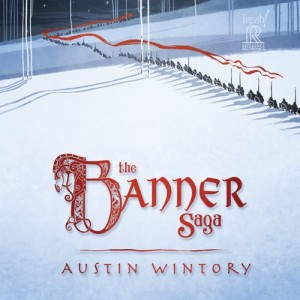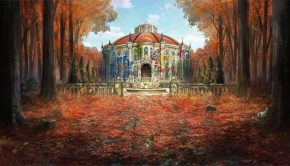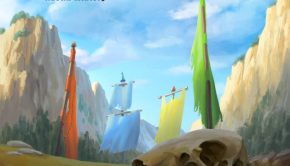The Banner Saga
 |
Album Title: The Banner Saga |
| Record Label: Reference Recordings |
|
| Catalog No.: FR-708 |
|
| Release Date: January 14, 2014 |
|
| Purchase: Buy at Bandcamp |
Overview
In The Banner Saga, Grammy-nominated composer Austin Wintory crafts a beautiful orchestral soundtrack to accompany vikings on their journey through snowy landscapes. The score contains a few key themes and motifs throughout, but actually, few of the individual tracks are likely to stand out. This is because the soundtrack is a very coherent work, like a single opus with several smaller segments that can easily be listened to straight through. The soundtrack has some very distinctive elements in its exotic instrumentation and vocals that are appropriate to the setting of the game, though the style may not be to everyone’s tastes. Still, it is hard to deny that Wintory has crafted yet another impressive work for The Banner Saga.
Body
The most distinctive feature of the soundtrack is its use of Icelandic vocals in tracks like “No Tree Grows to the Sky”, “Teach Us Luck”, and a number of others. These themes are mostly quite short and accompanied by a smaller ensembles including an exotic bukkehorn and didgeridoo to really cement the viking feel. As such they feel like northern tribal chants or bard songs, each carrying with it some fable or history. The pieces and vocals may at times be a bit too harsh and foreignly stylized for mainstream listeners to really appreciate, but they certainly work well in the context of the game. Overall, there aren’t really any standout melodies or songs; the vocals feel like one of the instruments and the pieces share very similar stylings. However, they are mostly effective, and the more moving ones include “A Long Walk Stills Ours Hearts” accompanied by Taylor Davis’ heartbreaking violin, “An Uncertain Path” with its marching emphasis, and “We are all Guests upon the Land”, which starts sombrely but finishes explosively.
The bulk of the album is highly cinematic, boasting the grandiose sound of the Dallas Wind Orchestra. It is true that many of these tracks do not sport strong melodies or hooks, but they are strongly atmospheric and not in the least bit boring or monotonous, having ample textures, dynamics, and movement throughout. The brass opening of “We Will Not Be Forgotten” sets the stage of the album with a sombre respect, while “How Did it Come to This?” finishes with thunderous percussion. “Thunder Before Lightning” uses a flurry of woodwinds over top a tense backdrop, and later, “No Walls Man Has Seen” makes further use of the mourning solo violin to wring out emotion. “Into Dust” even adds a bit of wailing electric guitar into the frenetic mix, while “Weary the Weight of the Sun” is beautifully ambient and dreamy. Things come to a climax in the score with the 10-minute epic “Of Our Bones, The Hills”, with its steady buildup of the orchestral and percussive elements, and the haunting choral ending.
The rest of the album reduces the ensemble for a more intimate sound, and puts at the forefront some more exotic instruments like the didgeridoo. “Cut with a Keen-Edged Sword” is a great variation on one of the main themes with light woodwinds, pressing violin solo, and percussion. This theme also shows up in the more peaceful and calm “Three Days to Cross”. Other tracks in these veins include songs like “Huddled in the Shadows” and “From the Table to the Axe”, often featuring Davis’ emotional solo violin over light and calming backing of the Dallas Winds. These tracks make a welcome textural break from the heavier cinematic cues of the score, and also help with the individuality of the score as a whole.
The last track of the album is “Onward”, a bit of a departure from the rest of the soundtrack. This song is more pop in its structure, featuring female vocalist Malukah. The track is very reminiscent the closing “I was Born For This” from his Journey score. The vocals soar over strong accompaniment, going through many of the instrumental motions of the rest of the score. It’s a great way to close the soundtrack, even if a bit distinct from the bulk of it.
Summary
The score for Banner Saga is a work well suited to the game it accompanies, and largely enjoyable to listen to outside of it. Although it is short on memorable themes, the soundtrack as a whole is moving, dramatic, and distinctively flavoured by its Icelandic and viking influences. These stylings may at times not resonate with every listener, but it is still undeniably effective for its setting. As well, the score is beautifully realized by the Dallas Wind and talented soloists, which bring certain times an epic sound and others a quiet and intimate sound. All in all, The Banner Saga marks another success in Austin Wintory’s growing catalogue.
Do you agree with the review and score? Let us know in the comments below!
4
Posted on November 6, 2014 by Christopher Huynh. Last modified on November 6, 2014.














